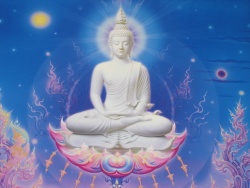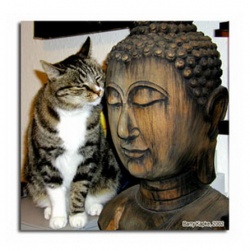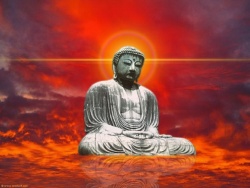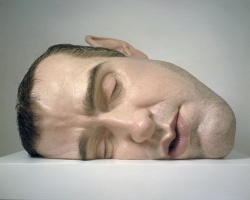Buddhist Views on Contamination
Everyone knows that Buddhism is composed of three Yanas, but all three are based on the fundamental truth of Sunyata. The Sunyata view includes an explanation of conditions but does not talk about seeds or causes. Although everything appears under certain conditions, there are no original seeds or first causes. If there were, there might be such things as eternally existing atoms or some kind of Creator
God. The Buddhist view of Sunyata avoids all these fruitless concepts by emphasizing a view of conditional phenomena that does not depend on the existence of original seeds.
One may see this in connection with any object, for example a bottle. It has no source, no seeds and no self. There is no entity, essence or self corresponding to what we commonly call a bottle. The bottle is gathered from various conditions such as the glass, the
glassblower's skill, the economic conditions of its manufacture, etc. All these factors may in turn be analyzed and seen to be composite and without self. Thus, however minutely you may analyze the bottle, no source or self will ever be found.
There are only certain conditions and sets of conditions in the Sunyata. All things are like this contained within. Even Buddhahood is likewise gathered from certain conditions. So we can see that the philosophy of conditions is a very important part of the system of Buddhism. Conditions are without limit but they all contain and are contained within the one nature of Sunyata.
When a Buddha abides in a static attitude or Static Samadhi he does not see a self anywhere. He sees that everything is void, that everything is the Dharmakaya. Here there are no differentiated objects so how could there be any one-sided view? This is called the Samadhi of Fundamental Nature. When Buddha is in this Samadhi even his own self disappears. For him there are no conditions but only the basic Sunyata
nature. In such a Samadhi he sees that all Buddhas, all sentient beings, the Six Realms, the Ten Dharmadhatus, all are included in the Dharmakaya. This is called the Former Samadhi, the Fundamental Samadhi or the Static Samadhi.
But when Buddha arises from that Samadhi he enters the Later Samadhi or the Discriminative Samadhi or the Dynamic Samadhi. These three names all refer to the time when Buddha leaves the silent state and undertakes some action to help others. But even in activity he does not depart from the Sunyata nature.
In the final Truth there are no things at all. There is no psychology and none of the concepts of psychology. There is no materialism and nothing associated with it. All are harmonized. There are no one-sided views. But Buddha does not just stay in the Dharmakaya as if he were dead. He arises to do something for the sentient beings, but still keeps the fundamental Sunyata nature.
The Sunyata is like a sheet of paper, blank on one side and with writing on the other. The Sunyata nature is like the blank side of the paper; it is just pure and void. There is nothing, no form, no color. Only the brightness of Samadhi. The Sunyata conditions are
like the side with writing. Many different messages may appear. But really the two are the same just like the two sides of the paper. When we talk it seems like two things, but when Buddha acts in the Dynamic Samadhi to save others he still keeps all the Wisdom of the Static Samadhi but now uses it to help others under various conditions.
Thus one must understand that in the Buddhist philosophy, conditions and Sunyata are inseparable.
Buddha has many Supernatural Powers so he can know every person's mind, Karma and character. He has no one-sided views. In the Later Samadhi of Discrimination, Buddha knows exactly which medicine to use to cure each disease. A common person might just say,
"Oh, this one should take Vitamin A and that one should take Vitamin D." But this is just based on some one-sided view. Such a doctor has no real wisdom. Buddha has wisdom because he has identified these two Samadhis.
Every Buddha has Ten Strengths, Six Supernatural Powers and Eighteen Extra Wisdoms. He can know everything in the past, present and future. He can actually know the specific events that have not yet happened. One common name of all Buddhas and especially of Karmapa is
Dusen Chenpo. It means "He who knows the Three Periods." When we say "Karmapa Chenpo" what does this "ChenPo" refer to?
What does Karmapa know?
He knows the differences, the details of the conditions. If he only knew the pure Sunyata nature what good would that do? He also knows the conditions. That is why he can really help people.
The Fundamental Samadhi is like a blank paper. The Discriminative Samadhi is like a paper with many pictures, symbols and messages written on it, but the underneath color is still part of the picture. So we can see that it is very important to learn what conditions we should seek and what
conditions we should avoid. We should always reflect on our own heart, mind, habits and character and then figure out how to save ourselves, to cure ourselves, to gather the good conditions and change ourselves.
Actually everybody already has the Buddha nature. Even the sufferers in Hell all have the Buddha nature. So do ghosts and animals. There is no way to increase it or decrease it. There is no need to practice it. It always remains the same and we can neither seek it nor get rid of it.
So obviously just having the Buddha nature is not enough. It is very important to know also the conditions. What conditions are good and which are bad? How can we gather the good and avoid the bad? How can we change the bad into good?
In this talk we only follow the Buddhist view. We do not consider the ideas of Science, or of the scholars, or of Christianity, or of Hinduism. We will only speak of the Buddhist view of contaminative conditions. According to Buddhist tradition every thing may be considered from four points of view: the Outer, the Inner, Secret, and Most Secret.
I. Outward Contaminations
A. Environment
Outward conditions mean our environment. It includes all of the physical world except our own body. in this category too are all our social interactions with our family, friends, other people and animals. We must learn to choose good outward conditions. Especially at the beginning of our practice we must seek out good conditions for meditation.
An ancient Tantric practitioner named Subahu had practiced for many years but had not gained very good results. He asked Buddha what he should do. Buddha pointed out many conditions that should be avoided. His advice was recorded in a Sutra and has been published in Chenian Booklet New Number 45, "Vajrayana Silas, Part One." That booklet contains twenty-six rules on how to serve the Guru. Next there are one hundred and
thirty-six rules taken from the Subahu Sutra and the Susiddhikara Sutra and itemized, numbered and classified by myself. They fall into six groups: Character, Dwelling, Eating, Actions, Repetition (of Mantra), and Practice. With regard to outward defilement the following rules extracted from the above booklet may be helpful:
16. Do not keep cats or dogs.
17. Do not kill sheep or goats.
18. Do not put a parrot or any other bird inside a cage.
20. Do not talk about a king, prince, minister, great officer, robber, prostitute, thief, fighting and war.
21. Do not go into any town, village or residence of an outsider (non-Buddhist).
26. Abide in the place of a Buddha or Bodhisattva.
27. If you cannot get such an auspicious place then dwell on the bank of a great river or near a small river or on the slope of a mountain. Do not live where there are wild animals, water animals, or underground animals as moles.
28. Dwell at a place where many good flowers flourish.
29. Do not live near noisy place and with people.
30. Dwell in a cave where there are no fierce beasts.
31. Do not dwell at a place where there are thorns, stone chips, bones or dead bodies, ashes, coal, foul mud, the holes of ants, or a place of dirt in the ground which has no bottom after digging.
32. Do not let a violent wind come into your room.
33. Do not let fleas and ants stay in your room.
34. Do not let your roof leak.
35. You must have windows on your walls and the inside must be bright and clean.
36. Make no door towards the south direction.
37. The residence should not be too far from the village or town.
38. Do not make a hermitage near a place where there are many persons.
39. The dwelling should have no outsiders.
40. Do not live with an outsider, a proud person, a rich man or a foolish man. Do not keep company with a hypocrite, a cheat or one without compassion who takes things from monks with the mind of a viper and oily lips.
46. Do not beg food from outsiders for they may give you some ignorant advice.
49. Eyes, when begging, are better to be filled with sparks and become blind rather than be ravished by beauties.
64. Do not go to a house in which there is a woman or domestic animal just in delivery.
65. Do not go to the theatre or any place where music is performed by male or female singers.
66. Do not go to a brothel, wine-shop, or any profligate place.
67. Do not go to a place where there are many boys and girls playing together.
68. Do not join the celebration of a wedding.
69. Do not go to a house where there is a cur.
70. Do not clap hands, sing songs, or dance.
71. Do not look at a fight among or between human beings or animals.
72. Do not dally or act in a hot tempered manner.
73. Do no gamble on any kind of chance.
76. Do not play in the water.
These are only a few of the Rules that Buddha was so kind as to give us. Readers may consult the above mentioned booklet for the rest. A few more are copied below in the section on food. Buddha taught these rules three thousand years ago, but they are still valid and can be used as models to make our own rules to deal with the difficult conditions now caused by modernization.
Even the Communists forbid their people to go to the Free World because they fear that the people might be contaminated by it. They tell them, "If you were allowed to go there you might learn some bad habits from the degenerate Americans. You would become addicted to all sorts of luscious pleasures that are not available here in your own country. So you must not go. If you do try to go, we will kill you!"
Many Buddhists in Eastern European countries like Hungary, Poland and Czechoslovakia correspond with me but they have no chance to visit me. Once a Czechoslovakian Buddhist scholar came to visit me in India. When I heard his name I was happy but very surprised. With
tears I asked, "How can you come here?" He explained, "I am an official in my country. The government has trusted me to travel so that I may collect some of the Buddhist books for our National Library. That is why I have this chance to visit India."
I asked him, "Would you like to stay in a free country like America? If so, I can introduce you to some friends who will take you to meet the American Ambassador in Calcutta. They can help you to live in America. You need not go back to your country."
But he said, "No. Even though our government is Communist in name, still the leaders are all good men. They do not follow the harsh policies of the Russians. Much less do they agree with the Chinese Communists. Ours is quite different. We can believe in Buddhism or
Christianity or any other religion without being punished. There is no need to go to America where everything is so expensive anyway. Besides, I am an official with responsibilities. Finally, my family is still there inside. Thank you very much but I must return to my own country."
Thus he was grateful but did not accept my offer. I just tell this story to show that even the Communists are aware of contaminations from outside. Of course, contamination is a relative term that depends on what you consider pure. They have their own ideas.
B. Theatres
Now we will consider what we as Buddhists regard as a pure or holy place. This is especially for the beginners, not for the Sage. For a sage everywhere is the same; everywhere is pure. I am not a sage but I try. Many ask me, "How is Berkeley?" I like everywhere! Berkeley is also good.
But still one can exercise some discrimination. I was asked by Mrs. Mary who said, "There is a moving picture called "Oriental Prostitute." It sounds very interesting. Will you go to see it with us? We already have tickets." I said, "No. I lived in India in my hermitage for
twenty-five years. I have totally lost my interest in the theater, although in my younger days I did pursue it." I also said, "In America there are so many theaters. They all have posters on the walls outside to advertise their motion pictures. Just by walking on the street I can see enough. There is no need to buy a ticket."
As mentioned above, Buddha also in the Subahu Requests Tantra for bad his serious disciples to go to the theater. There was theater in those ancient times too but now it is more highly developed.
Because we want to keep our good health we should not go to the theater. Even the modern health authorities and their families frequent the theaters and movie houses, but if you think carefully, you will understand the following. Do not the scientists and doctors all say that one must have a
constant supply of fresh air? In a theater do we not find many people all of whom must continually exhale? When you breathe in there where does the air come from? Do you think that air is clean or dirty?
Because you do not consider such things but just follow your habit it seems that the theater is a good place to get pleasure, a good place to spend your weekend. It seems very nice but does it help your Dharma? Does it help your meditation?
Surely the one who is in an advanced position may be able to make use of defilement. Even I myself once went to see the famous performer Mei Lang Fang. When he visited America he was awarded an honorary Doctor of Arts degree. The music and the action all fed my meditation of Mahamudra. Afterwards I returned to my sponsor and gave a talk on how to meditate in the theater. But this is not for the beginner.
Buddha's teaching is for everybody, not just for the Sage or the advanced person who already has some attainment of Samadhi. So the person who is just starting to practice, who is still establishing his good foundations, who has not yet achieved a real Samadhi and who therefore does not have the ability to purify and transmute the unhealthy conditions, should not go there.
Movies and theaters are of course very common. Everyone goes to them. But the more common a thing is, the easier it is to fall into the common state of defilement. When we see things on television or in movies there is an unfortunate tendency to copy them. A very sad event was reported in the Reader's Digest which is not fiction but actually took place.
Some parents left their small baby in the care of a maid. They told her, "If the baby wakes up and needs anything like food or a new diaper, you take care of it; otherwise, you may just watch television." The servant sat on a couch next to the sleeping baby and turned on the T.V. There was a program about an insane woman who had killed her own baby. The way she did it was to smother the baby with a large pillow. The servant thought, "Is it really so
easy?" So she put a pillow on the baby to see if the baby would notice. She had no intention of leaving it on long enough to kill the baby, but just then a very interesting program came on T.V. and when she remembered the pillow, the baby had already died. She was terrified and started to run away but just then the parents returned and she was caught. This is a true story. I only bring it up to show what bad effects movies and television can have on people.
So we see that not only is the physical air bad in the theater but there are many mental pollutions as well. The theater, movies and television give many distorted images that claim to represent pure love. The real pure love is only found as part of the highest teaching. It is only possible in the final stages.
But in the theater one sees all the pure things mixed up and confused with dirty things. This is because the truth is very difficult to accept, so rather than trying to teach the truth they prefer to hold the common person's interest with sex, violence and useless things.
Even Shakespeare used stories of sex, robbery, fighting and quarreling. If even Shakespeare must use these things, what can we expect from modern writers? They cannot help but teach bad things instead of good things. So it is better for us to protect ourselves and not go to see them.
A motion picture lasts at the least two hours. In this period how many times could you chant OM MANI PADME HUM or OM AH RA BA CHA NA DHI? It is much better not to waste our precious time.
Even if you go to the movies again and again, you will never be able to satisfy your desire for them. When you get to this point there is a special kind of theater called "Adult Movies" where you can pay to watch sexual intercourse. You can see on a big screen many people engaged in all kinds of sexual activity. Very interesting. But you have been the star of such actions; you already know how to perform sexual intercourse. It is the same thing. Why should you need to pay to see it on a screen? It would be much better if you used the price of admission to help the Food Project or the Free Clinic. For the three dollars it costs for the ticket instead you could buy thirty fish, take them to the river and save their lives.
There are many places that should be avoided, such as slaughterhouses. Nowadays this is not so obvious because the slaughterhouses are always well hidden from the public. Cemeteries and graveyards are also places of defilement but there is a special reason that one should go to them. It is because in the
cemetery one is very aware of impermanence. Thus you can see that some places are best avoided altogether while others may help us to see part of the truth.
Milarepa pointed out three places that should be visited to practice meditation. One is a cave, one is a mountain, and one is among graves. Mountain means a mountain without any people, not like my hermitage in Kalimpong. Although when I first moved there it was very quiet and
holy, just part of a small village; gradually many Tibetan businessmen and other residents kept moving in; all the streets were extended and the village became part of the city. My solitude was destroyed.
Why do the Sages emphasize solitude? Because the silence, fresh air, mountain view, and lack of disturbing persons all help one to get good meditation. So Milarepa always emphasized these three places.
I meditated in a cave for two years, in the mountains for many years, and in a cemetery for one year. In the cemetery I was very aware of impermanence and was very diligent in my practice, much more so than when living in other places. To live among graves creats a fear of death and so we become diligent.
If you live in a comfortable hotel with good food and luxurious furniture, the comfort produces a tendency to be lazy. You will then fall into laziness and spend too much time sleeping and being idle. But if you live in a cemetery you will always be aware of the
impermanence, the shortness of life and will always fear death. Thus you will be anxious to practice constantly. This is why Milarepa mentioned these places.
Yesterday a friend had the good idea of making a film about Milarepa. I suggested that she goes to Nepal and films the Himalayan caves where Milarepa meditated. It might be inspirational for modern Buddhists to see the places where that Sage actually lived.
C. Dropping Out
Nowadays I am sorry to say that though many young people have dropped out, they have not really renounced in the Buddhist sense.
Some still take money from their parents, and some take money from the Government. If you sit on Telegraph Avenue with your wife and engage in some small business, it is not the action of a real dropout. The real dropout goes to the mountains and meditates. The small businesses
on Telegraph Avenue and the big businesses of their parents are in fact the same. Both are based on the exchange of goods and services for profit and are within the realm of selfishness. They are still attached to material things. This way one will never escape from the contamination of the world.
Buddha said that the home is a dirty defiling place. In home life there are so many distractions and obligations.
Nowadays some young people have left their parents and think that they have dropped out, but they still keep their wives with them. In fact they cannot take one step without their wives. They have left their parents but can they live without their wives? This is not yet real renunciation.
This talk may seem very harsh, but I just comment on what I see in America and point out the Right View according to the Buddhist tradition.
D. Animals
Many people always say that animals in the house are good friends. When a lady at one local Buddhist center acquired a cat, the Lama
told her to get rid of it. In this matter he was quite in accord with the Buddhist tradition. Buddha forbid his serious disciples to keep a dog or cat or to feed the pigs or pigeons. One should not keep any pet in his home or cave.
Yet some modern students who are trying to renounce still keep animals with them. A student went to live in a cave but he took his dog with him. He also brought his dog along when he visited San Diego and the dog made stool in someone's house. He had to clean it up.
Some Americans treat their dogs better than they treat their own brothers and sisters. Surely I would like to see every one be kind to all animals. But not too kind. Recently I saw a man sitting in his car. On his right was his wife. In the back seat was his dog. First he kissed the dog and then with the same mouth he kissed his wife.
In the East one would never see such a thing. The common view of Westerners is that the West is clean and the East is dirty, but by Buddhist standards, the East is relatively clean and the West is dirty.
In the East to kiss a dog, to embrace a dog or to cohabit with a dog is very rare. But in the West many girls keep wolflike dogs to have sexual intercourse with. This is an example of a very heavy dirt, a very defiling situation.
The ancient female sage named Marje Lun-mo was an incarnation of Dolma, or Tara. She was a very holy being. She was Bodhidharma's dakini. When he returned to Tibet from China he met her. I have translated her biography into Chinese and
it will be printed soon. Once she foreknew that some students would come to her. She told her attendant, "Tomorrow two students will come. They will both be clad in dog skins. Admit them but first ask them to get rid of the dog skins." The next day, it actually happened as she had said. Then she gave some teaching. She said, "Do not use any animal's skins for clothing. It is not good to use even tiger skins, but especially don't use the skins of dogs." Thus she warned them against these bad conditions, and pointed out nine bad conditions of the dog.
One is that the dog has karma from past lives connecting him with many ghosts. These ghosts follow the dog around. So if you want to avoid the ghosts, you have to avoid the dog.
Many Tibetan lamas and laymen keep dogs. Especially travellers who have dogs for protection. In Tibet robbers are very common. When the travellers stop for the night they do not have hotels or motels, but have to camp in tents. During the night robbers come and kill them and take all their gold and valuables, so they keep large fierce watchdogs to guard against robbers. These Tibetan dogs are large and vicious. Their mouths are always red with blood and if they bite you, it is always a fatal bite.
I remember even Szudun Rinpoche in Papong had one of those large dogs. He kept it on an iron chain. But it was so strong that once it even broke the chain. A lady that was unfortunate enough to be passing there at that time was bitten and died immediately. Szudun Rinpoche was very ashamed. He confessed his mistake and paid a large sum to her family. But what is the use of money? Can money bring her back to life?
Now some famous Lamas keep small expensive lap dogs. Even one of my own gurus had a small dog with beautiful hair. He fed it tsampa from his own plate and gave it water from his own cup. Even though he is my guru still I cannot agree with this. These are all examples of bad conditions but we see them even affecting those famous Lamas.
A dog follows the human's lead. On the one hand, if you pet him and scratch him, gradually he will be pleased and stand up and kiss you. Then as the dog becomes excited his sex becomes excited too. By and by he starts to smell your private parts. So even though you had no intention of making love to the dog, eventually you become involved in this immoderate relationship.
On the other hand, if you do not scratch and pet the dog but just tell him firmly, "Sit! I will give you food. Sit here!" he will obey. A dog can at least be trained to serve some useful purpose.
The cat is just as bad. The cat's special characteristic is that it is very hard to get rid of. The cat just wants to move his body and to touch you. Actually, he does not love you but just wants to touch anything to relieve the itching of his body. He will also rub against the furniture in the same way.
That lady at the Buddhist center said to me, "Oh, this cat loves me so much! Look how he runs up to me and rubs against me!" But I explained to her that the cat was only easing his own discomfort. I said, "Don't just see yourself, but look more carefully. See how the cat rubs against the legs of that chair. Does he love it too?"
Every animal has its associated problems, not only dirt and ghosts but also fleas. If you stay with animals the fleas will jump into your clothing. If a flea is biting your private parts, how can you meditate then? Actually the flea does not want to be on you, it much prefers to stay on the dog or cat. It is attracted to the smell of the animal, but sometimes the flea is jumping around the room and the animal leaves suddenly. Then the flea has no choice and must settle for your body instead.
E. Smell
Every being has its characteristic smell. You remember in the biography of Milarepa when, after his Parinirvana his body was being cremated, many heavenly beings appeared in the sky overhead. The human disciples called to them, "Come down here with us. Please come down to the earth and join us. Why do you not come down?" But the angels and devas cannot stand the smell of human beings.
Only if your meditation is good and if much of your defilement is removed, and if you burn some good sandalwood, then they might come near you. Even then maybe not too close.
I remember when many gods came to me all my body gave off a very sweet smell like sandalwood. Even when I went to the toilet, I still felt that sweet sandalwood smell. Actually. I smelled two kinds of smells but they were not mixed. When the Dakinis come to you there is also a special smell. If other people are there they can also smell the holy beings. Do not think that when
you are alone in your room that you are really the only one there. There are many things connected with your body that are never considered by common thought. If one prays earnestly, the Buddha will be with you, the Bodhisattvas are with you, the Yidams are with you, the Dakinis are with you and the Protectors are with you. These are the pure forms of consciousness.
On the contrary, if one loses his Bodhicitta, if one loses his meditation, if one loses his Vinaya, then the holy beings will go away and the evil ghosts will come.
My friend, Mr. Wan Chi Kos a very earnest Buddhist. He has performed the Homa many times. His eyes have developed a special ability and are able to see ghosts. He told me, "When I am in the street sometimes I see good people driving along. Even though their car is moving very fast, still
many gods are sitting on it. But the bad people, even though they may also be rich and drive expensive cars, yet following-along behind them are many ghosts."
Because he has such eyes he can really see them. You might not believe it, but just because you who do not have such eyes cannot see them, it does not mean that they are not there. Actually everyone's individual karma connects him with many beings. They may be holy beings, they may be ghosts, or they may even be the messengers of Yama who have come to take your life.
If an evil being comes to harm you, or even one of Yama's attendants comes, how can you know? Even an evil being may not know when he will meet you. Therefore, you must always be careful and choose your conditions carefully. Good conditions cause good to increase and go from good to better to best. Bad conditions cause bad to increase and go from bad to worse to worst.
For example, in my room I have already burned much sandalwood. This causes the gods to come. If you burn the Hindu incense that smells like cheap perfume, the bad ghosts will come to take the smoke as food. If you burn a lamp the holy beings will be pleased with the brightness. If you just leave it dark, they will not be attracted.
Nowadays many restaurants keep the lights very low. They are too dark. It seems to some people that darkness is the same as quietness. So we can talk small talk and enjoy a quiet dinner. Actually this is not good reasoning. Quietness does not follow from darkness.
There are many other things that could be pointed out but now we must go on to the next part.
II Inward Defilements
A. Food
Inward refers to the body and therefore to food. We will later give a special talk on diet, but now a few things should be mentioned.
Some food will cause you to get angry if you take too much. In this class are all hot things like peppers. Others, like turnips, will make you sleepy. Turnips cause intestinal gas, bringing energy down and thus putting you to sleep.
Too much food is a defilement because it makes you sleepy; too much is also bad because it causes disturbed mind. Sleepy mind, disturbed mind and nonsense mind are all disturbances to meditation. If we want to get good Samadhi we must not neglect to regulate our diet. We will speak more on this in another lecture.
B. Drugs
Many Hippies and drug addicts say that drugs are useful for meditation. They say that on a good trip you can meet God, that the ancient sages used drugs. So it seems that drugs are holy. But this is the same mistake again of thinking that the beginner is the same as the Sage.
For the Sage drugs can sometimes be a little helpful, for example Marpa drank wine. This was for developing Tummo, to help him concentrate with great warmth. But Marpa already had achieved an advanced degree of Samadhi and then used the specific function of the wine to make it
stronger. Thus the Sage may know how to use a drug to excite a particular function for a particular reason. But this is impossible for the beginner. The beginner should forbid himself the use of any kind of drug. Then he will have a chance to someday become a Sage.
Many cases are on record of those who have taken drugs like L.S.D. and have had bad trips. Much trouble resulted: Some committed suicide, some tried to fly out of windows and were killed by the fall, some became very angry, some very frightened, some suffered heart attacks. From all these examples we may generalize and say that these drugs should not be used by the beginner.
In a final sense drugs cannot be either good or bad. If they are really good why do so many people injure themselves with bad trips so that they can no longer function normally? If they are absolutely bad why do some people have good trips and see God? But in practical terms we should avoid all drugs.
Every dharma is void and without self. Everything depends on certain conditions. What may be good for one person may be bad for another. Since this talk is for those just learning to practice Buddhism, I simply advise them that drugs are harmful.
It may seem that Buddhism is too hard to practice. Hinayana, Mahayana, and then Vajrayana: it takes so much time to practice this and that and go through all the steps. Why not just take some L.S.D. and get the same effects immediately? Just by action of the chemical you can see many things and it seems very good, but there is no certainty and it may also turn out to be very bad for you.
The effects produced by drugs are not the same as that produced by real practice; nor do they become holy merely by talking about "the Yoga of taking L.S.D." A real practice is pre-determined and dependable; it has a certain initial Cause, a certain practical Course, and a certain final Consequence.
For example, when a Buddhist develops the Bodhicitta, the Bodhicitta of Will is the Cause; the Bodhicitta of Conduct, the Bodhicitta of Victorious Significance, and the Bodhicitta of Samadhi are the Course; the Consequence has been demonstrated and exemplified by all the Buddhas and great Bodhisattvas. If you practice, there is a certainty that eventually you will succeed.
On the other hand with drugs like L.S.D. is there any such certainty? What is the Cause of L.S.D.? Does it contain the seed of Buddhahood? Where is it to be seen? No such things will be found. It is just a chemical. It is just a material thing with no consciousness. How could it be a Holy Cause?
What is the Course of L.S.D.? Some take it once every three days, some every week, and some only takes one trip a month. If one trip a month produces a certain realization, does taking it every day cause more realization? No. Who has defined the Course of L.S.D. usage? A course should be dependable,
for example, when we go to school we take classes in a regular order and eventually get a degree. Does the drug have any similar dependable fixed course?
Some L.S.D. has one form, some has another. I myself have taken L.S.D. three times. Not for myself but because some young people came to my hermitage and asked me to be their witness and guide as they took it. Since they asked for my help, I had to accept.
The first time it was white powder, the second time it was a purple pill, and the third time it was a small piece of gold paper. This last one was very powerful. There were five people with me at my hermitage. After twenty minutes everyone began to act according to his particular conditions. One began to giggle foolishly like a lunatic. Another one started to sing. Still another felt very warm and took off his clothing. As for me, I
just meditated there. I felt that my meditation was very strong. So I determined that it could sometimes help the person who already had a deep Samadhi but not the common person.
That day my friends were under the protection of my hermitage. They just had a little interval of madness without much harm, but this was a special condition. There is no certainty inherent in the drug. If we could depend on certain results whenever we took it, then the taking of L.S.D. would be worthwhile. But its effects are always dependent on conditions that we cannot completely control.
My karma was able to protect them, otherwise they might have had less pleasant experiences. If they had just taken it at their homes, each other's individual karma would have been seen in different results. Some might have become angry and tried to kill other people. Some might have thought, "I can fly!" and tried to fly out the window and had been killed.
These kinds of effects have been reported not once but many times.
In addition to the immediate effects, there are delayed effects. These hide in the nerves until they get a chance and then come out when we least expect them. There is a boy who lives near Berkeley who has taken L.S.D. a great many times. Even when he is not taking it he still suffers from
uncontrollable-shaking and fits of rage. He broke a friend's window and a Lama's window. Once a Chinese monk told me that this boy had told him, "You are a holy being, I am also a holy being. We should try to save the American youth." The monk said to me, "I don't want to listen to his mad talk. He might break my window too!"
I have prayed and done some good deeds therefore am protected by the gods. When that boy came to see me, he prostrated himself before me as soon as I came to the door, but I looked at his face and saw that he was trembling. He asked me how he could stop his trembling. I told him, "Don't take any more L.S.D., then you won't get so upset and break people's windows." The sad thing is the windows he broke have been repaired and although they cost a lot of money
are now as good as new. But the boy himself continues to tremble more and more and every time he takes more acid his trembling gets worse. Now the windows are all repaired but his disease is far from repaired. He has confessed to me that he knows he took too much L.S.D., and yet, some people say to me, "You don't really understand. How can you say that it is no good?"
Consider the case of the late Alan Watts. He was a long-time Buddhist but then started to take L.S.D. He recently died in his sleep from a heart attack, very peacefully. But most people don't know that to die in sleep is to die in a state of ignorance. When you die in
your sleep you have no chance to think about good rebirth, to think about Amitabha, or to do anything to help yourself get good conditions of rebirth. In a case like this a person falls into the lower three states of hell, ghost, and animal. The very best he can hope for is to be reborn as a pig.
Alan Watts was an old friend who corresponded with me. After he became a Hippie he began to emphasize drugs although he still read The Tibetan Book of the Dead and tried to use it to guide his acid trips. But what good did it do to him? As he did not know he was going to die that night, who could read this book to him? Thus both young people and old scholars hurt themselves because they do not carefully consider the
Cause, Course, and Consequence of their acts. Poor Alan Watts just received the consequence of death by a heart attack in an unconscious condition. This makes me very sad.
If you have already taken it, what can you do? You must confess and always keep the thought, "I have this condition inside my body. It is a defilement of my body that must be purified." Always reflect on the inner body, the inner energy. Whenever any little excitement of anger arises, it must be stopped immediately. Just go into the forest and do some chanting and sing a good song of Milarepa. Don't let the
angry energy grow. There is no need to consider if you are right or he is right--just leave it. Any kind of quarrel can cause a violent reaction in your body. This is very dangerous to you. Never forget that these things are hiding in your nerves ready to hurt
you, so you must always watch your mind, watch your energy and always be cooling it down, cooling it down. If you can control yourself for a long time, eventually it might be cured.
We should also forbid ourselves to use wine, spirits, and tobacco. When C. C. Chang was with me he did not smoke, then when he left me he began to smoke. After some time we met again and I asked him, "Why do you smoke those cigarettes? You know they are bad for you." He said, "I smoke for social reasons. Whenever you meet somebody it is so easy to just give him a cigarette. He is happy immediately. It only costs a few pennies and
it makes many friends." I told him, "You must stop; otherwise you will have some trouble." But he kept on. After three years he developed heart disease. Then he told me, "If I had followed your advice, I would not have this heart condition." Then he had to stop but the damage was already
done. In his childhood he never had this bad habit, only later under the influence of society he began to smoke. And then he became in turn a bad influence on others. Society is like this, it is just a place people exchange bad habits.
A Buddhist must hold firmly to his Right View. The Buddha did not smoke nor did he drink. Whatever he did we must do too; whatever he did not do, we must also refrain from. We must not pay any attention to what society thinks, we must not consider what common people say is right or wrong, and must not care about social intercourse and approval. We must just follow the Buddha in every way.
Buddha's example is plain. Even though he has died, his biography and teachings are still here. His path is still open to everyone. We must copy his behavior completely. That is why I always emphasize the Tradition. If we follow the Buddha we are practicing Buddhism; if
we follow the ideas and habits of others we are not really practicing Buddhism. So we must follow the Buddha, the teaching of the Dharma, and those who preserve the teaching, the Sangha.
Not only did Buddha succeed, but over the centuries this Dharma has produced many Sages. The examples of all the Patriarchs and Bodhisattvas prove that the traditional teaching is reliable; there are three thousand years of proof.
But drug use, although isolated experiences may seem good, has no solid record of success. In the few years since drugs such as L.S.D. have been widely used, what have we seen? A few people who have had good trips. Many more have suffered injury of one sort or another. Has the drug L.S.D. produced any Buddhas or Sages? There is no record of permanent good results.
At first even the Government did not know if L.S.D. was harmful. Then when the data began to appear from the courts and hospitals, the Government passed laws trying to protect the people. Actually this Government loves us even more than our parents do.
Today many young people hate the Government. Although they get upset about a great variety of issues, the main reason behind their anger is that the Government has made drugs illegal. "Look! They are putting us in jail and all we did was smoking marijuana!" And so they hate the Government and think that anyone who tells them not to indulge in drugs must be completely bad.
Actually even the worst of the American political leaders are still very good. If they were really bad, they would say, "Oh, you want drugs? You can have drugs but you must pay a heavy tax. You seem to have so much money. Bread is not enough, you must have meat; meat is not enough, you must have wine; wine is still not enough, now you want drugs, too. You must be very rich to buy all these things, so you will be able to pay this heavy tax." The real bad official acts like this. They do not care if you become insane, or if you commit suicide. All they are interested in is getting your money; that is how a bad Governor acts.
The American ones are not like that. The Government here loves you: it protects you and even gives those unable to work some money. In China you
would never hear of such a thing. There they would say, "You have only yourself to blame. Nobody asked you to take drugs. If you cannot work and have to suffer in poverty or starve to death because you injured yourself through drug use, it is your own fault. Why should the government worry about you?" Our Government here in America is so kind, and we should act in a good manner towards the Government. We should pray for the Government, pray for the Nation, pray for the Dharma in the Nation.
On the one hand, you should reflect on your mistakes and not commit them any more; on the other hand, you can develop your Bodhicitta towards everybody including your parents and your Government. In the Buddhist tradition in China there are four Benefactors. First is the Guru, second is our parents, third is the Government officials who protect us from war, thieves and other dangers, and fourth is all sentient beings.
Why is every sentient being our benefactor? Because people do so many necessary things for us. The farmers supply us with food. The tailors and seamstresses make our clothing. Even the garbage men carry away our dirt. They love us and so we should love them.
Why do we not recognize these benefactors? Because we give them money in exchange for their work it seems that there is no need to be grateful to them. They have done their job and gotten their wage. If you always think like this, you will be blinded by money and unable to develop your good mind.
Money is never the only consideration. For example, when I lived in Kalimpong, I had no washing machine. I could have paid some Tibetans to wash my clothing for me but all the Tibetans lived too far away. There were many Nepali people living nearby who would have been glad to earn
money in other ways. But there is a Nepali custom that the wife may wash only her husband's clothing. If any woman were to wash another man's clothing other than her own husband's, she would be regarded as a prostitute. It is too shameful for them to even consider. When I tried to get one poor Nepali to help me, she said, "I will not do it. Even if you were to give me a hundred dollars for each piece of clothing, I still would not do it."
Thus we see that even when money is paid, it is still not the most important thing. The person must first agree to accept your money. It is not possible to put a price on everything. If someone agrees to take your money and work for you, he is also a kind of benefactor and you should feel grateful to him.
III. Secret Contaminations
A. Sexual
Yesterday we talked about the inward diet and I will talk more about diet in future lectures. But now I will talk about diet because some diets increase sexual desire while others tend to reduce it.
Regarding diet and sex: there is a story which tells about the Last Emperor of the Ming Dynasty requesting the Taoist National Guru to offer him some diet or food which would make his penis very strong and excited. In short, the emperor wanted the Guru to
concentrate all his efforts in manufacturing the best aphrodisiac possible. Now it seems that both the Emperor and the National Guru should have more altruistic things to do, however those Emperors at the end of a dynasty tended to be of inferior quality.
The Taoist religion does not follow the vinaya, the rules, commandments, etc, as a Buddhist does. Although Buddha explicitly forbid his disciples to kill; the Taoists only wanted to make the Emperor happy.
First the Taoist master fed a male lamb large quantities of ginseng over a long period of time. Sheep are animals which have a strong tendency towards sexual intercourse. When you go to a village, you can see a small lamb only a few days old, jumping and playing very
happily, even trying to have sexual intercourse with its mother. The lamb after being fed the ginseng was isolated and forbidden to contact any female lambs.
Next the lamb was killed and fed piece by piece to a dog. It is said that dogs also have very intense sexual drives, especially white dogs. This dog was isolated from all other dogs male or female. Eating the lamb meat directly, and indirectly eating the
ginseng which the lamb had eaten, the dog became very aroused --his penis was constantly erected and swollen to a bright red color.
The dog was killed and his meat mixed with soybeans, then fed to an ass. The ass's penis is very strong, but he is a vegetarian; however soybeans contain many hormones good for sexual vitality. These mixed with the white dog's meat and eggs proved to be quite a potent mixture
for the ass. He was isolated and daily fed the secret mixture, his sexual desire and potency growing well beyond the norm. When the aphrodisiac mixture was finished, a female ass was led to the excited male. Her feet were bound and the male was allowed to enjoy himself, his partner not being able to escape.
Just before the moment of ejaculation, the person who fed the ass his daily gruel, who was standing there with a knife called the precious sword, cut off the ass' penis. The poor miserable ass did not die, but probably wished he had, since he wasn't bothered by his sexual
desires again. The time of severance is kept to a very precise moment; a moment too late and all is lost. The penis is removed from the vagina then cooked in a special manner and fed to the Emperor. What is the result? It was said that Emperor Fou-an killed over one hundred concubines as his own penis had become extraordinarily powerful after eating the aphrodisiac prepared by the Taoist master.
Surely, such a diet could be classified as a contamination to say nothing of the concubines who were killed . So we should also watch our diet to make sure it is not overly sexually stimulating.
Sex should not be simply regarded as an evil; even the common people believe that God created the penis and vagina especially for sexual intercourse. Even animals and very tiny insects are not without their reproductive organs. However, sex
was not meant to be overindulged in and should be enjoyed in moderation. The Taoist texts give general guidelines as to how much one should have sexual intercourse according to one's age. Those youth under 30 may have sex once a week. Past 30, once a month; 40 years old, every
forty days; fifty years old, every fifty days; etc. After 60 one should stop entirely. I do not fully agree with the Taoist system. After 30 every two weeks is enough no matter what age.
In the Hinayana Buddhist tradition, laymen go for one day and one night without eating meat or enjoying their wives. They also do not wear any precious ornaments and follow the five basic silas very seriously during this time. Nor do they sleep on a big comfortable bed. This is one of the eight conditions of the vegetarian practice.
In China we always connect vegetarianism with both "upside" and "downside". This means that if you are not eating meat you are also not having sexual intercourse, or vice-versa. The two practices are interrelated and therefore go together. It is harmful for one to be vegetarian and
also have sexual intercourse. It will deplete the vital energies seriously, since meat is essential in the production of our human sexual fluids. So if you have sexual intercourse, you must take meat if you want to remain in good health with full vitality.
Monks (Bhikshus) are forbidden to eat food after twelve o'clock noon because if your stomach has food inside when you go to sleep, for example, if you eat dinner at six o'clock, then your penis will be more easily excited. So this ascetic rule of Hinayana was developed just to prevent the stimulation of the sexual vitality during sleep.
There are six days of vegetarianism on which one should not eat meat. These are the 8th, 14th, 15th, 25th, 29th, and 30th of the lunar calendar. These coincide with the full moon and the new moon. Sexual intercourse is forbidden on these six days, therefore, meat should not be eaten because it stimulates the sexual instinct. Furthermore, our sexual reservoirs are found to be most potent on these days. If we have
sexual intercourse, we lose much more semen and ovum and vital essences on these days. This fact is proven not only for man, but many animals are found to be more sexually potent on these days. For example, there is a type of fish called Large Head. On the fifteenth if you
cut open its head you will find more essential things in the brain than are usually found there. By the 30th they are all gone. Taoists recommend those who lack the red bodhi of yin to take Large Head fish on these days. If one lacks white bodhi of yang, he may take ginseng or sea cucumber.
Each month our energy passes through a complete cycle through all the five chakras. Each chakra in corresponding order is particularly sensitive for about three days. By the fifteenth day of the lunar calendar the head chakra will be especially active. The month is divided into two halves, the first half called bright of the moon and the second half called dark of the moon. On the fifteenth, our energy is
concentrated in the fifth chakra centered in the head chakra as well as on the 16th, 17th, and 18th day. The period of hermitage for 3 years, 3 months is not really 3 years, 3 months but 3 years and 3 one-half months (one and one-half months). Buddha was a complete Buddha and knew the Tantra quite well. All the rules he made were according to the Tantric theory but he did not teach the Tantra outwardly to very
many people. He only taught a very few people about Vajra Love. His main work was to propagate the Hinayana and establish all the rules, vinaya, etc., so that his followers could get a good foundation. In these present times it is much more difficult to teach Hinayana than it is to teach Mahayana or Vajrayana, but the Hinayana is still the foundation needed for each person's practice.
Nowadays many people think they have renounced or dropped out but they have not yet really satisfied this Hinayana foundation. Their motivation is not really to reduce their desires but instead they use the additional time they have to indulge in more desires, more sexual intercourse, more drugs, more entertainment and fascinations of all kinds. But they do not practice Buddhism, Hinduism or do any good deeds to help
others. They just go to the mountains and find some village girl and take ginseng and smoke marijuana under the pretext of practicing Dharma. My friend Mr. J. T. is such a man and likes to take many stimulants. Once I even saw him take garlic. The Hinayana teaching forbids one to take garlic because it stimulates the sex organ. But if you have really renounced and are diligently practicing the Dharma, all stimulations
are childish and a waste of time for the genuine practitioner gets much more energy and vitality from his Dharma practice than he can from any cheap drug. One should renounce not to facilitate more sexual intercourse and bad habits but to cut off transmigration, not to prolong it.
Nowadays sexual relations are much more free and displayed openly. I sometimes feel that if such tendencies continue to increase, we may even see sexual intercourse occurring in public places, just like the dogs do, any place is fine as long as both parties are willing. Some people think it's a free country, and they are not hurting anybody else, so why not? But I certainly do not agree with such logic.
Adult bookstores and adult theatres are a kind of defilement, especially since even young people can patronize them freely. There is no strict control; if you have money you can see. There is no shortage of sex education, besides one can usually figure such things out with little effort. I learned masturbation when I was 8 years old. In Sweden and Denmark children learn sex education from the time they are
eight years old. A lot of the education is good, teaches them about V.D., etc., but a great deal of it just excites their sexual nature and curiosity prematurely and mankind, being able to endure so much pain, usually does not follow the good advice anyway. The karmic
inertia is so strong that even when you teach people good habits, they ignore them and seem to follow the bad things whole-heartedly. Human beings learn the wrong very easily, just as easily as a landslide comes tumbling down the hillside. But the good things are very difficult for them to learn, just as difficult as climbing to the top of a very steep mountain.
These sexual rules are not just blind codes arbitrarily created to prevent one from his pleasure, but have practical reasons handed down through the ages. For example, good sexual habits by two lovers who do not use any kind of drug, etc. to cloud their consciousness and feel deep love for each other will usually bring into the world very fine offspring with clear minds, excellent health and disposition. The same cannot be said if the good conditions are lacking.
The Taoists are very detailed in the proper time to have sexual intercourse. They say that if one is to discharge the semen at the same time that thunder occurs in the immediate area, the child will be born without the sense of hearing. The point to realize is that the outer world and the inner mind are always interrelated, so pay attention to this fact and you may save your child a great deal of suffering.
For example, if conception occurs when the parents are drunk, the child's consciousness will be cloudy,just as if it were drunk. However intelligent it might have been will be reduced because of the parents' negligence. L.S.D. has been suspected of creating birth
defects; surely if one is under the effects of L.S.D. during the time of conception, it will lessen either the physical or mental vitality of the offspring.
It greatly reduces one's vitality if intercourse is performed immediately after urinating or defecating. In the former case one should wait at least fifteen minutes before uniting with his wife, and in the latter case, thirty minutes. After bathing one should wait at least thirty minutes before intercourse. Whenever the body loses some of its fluids, etc., its vitality is lowered and is more susceptible to attack by disease. Even the bulk eliminated
by waste products creates a temporary vulnerability, so one must wait until equilibrium is restored in order not to over-tax one's vitality. If one is in the habit of urinating, then going to bed and immediately "playing" with his wife, it will cause premature impotence. So if you follow good sexual habits, you will be able to prolong your sexual life. Once I met an old man, 95 years old in Berkeley; he had a wife
who was 85 years old. I asked him quite frankly if he still had sexual intercourse with his wife. He said, "Surely! Why not!?" Probably this person did not over indulge himself in his youth, therefore he could harvest the fruits of moderation in his very old age. There is a Chinese proverb
which says, "Love me little, but love me long." So please do not over indulge yourselves, but enjoy your sex life fully over a long period of time. If you are young, to have intercourse every two or three days is enough.
After you take a hot bath all the pores of your skin are open, and if you indulge immediately in intercourse, you will lose much more vitality than if you did not bathe. I heard the following story when I was in China.
There was a resort, a combination of hot springs and restaurant. It was possible to get a private bathing cubicle to share with your wife or lover or prostitute. One man in good health had sexual intercourse with his wife in a hot bath and died immediately afterwards. His whole body swelled up. The doctor said it was because his system was so totally open and relaxed that not only did his semen discharge, but his
subtle life-essence flew out also. This is a rare occurrence, but does demonstrate the extent to which the energy may be discharged when stimulated by a hot bath. Many people believe that a hot bath makes them feel so comfortable so if they indulge with their wives it will be doubly comfortable. But be careful because you will doubly lose your vital essence and possibly kill yourself.
In China, young babies and children would sleep in the same bed as their parents. The parents' love action would cause the baby to wake up and cry. The mother would immediately give the child her breast to nurse. This is a very bad defilement. The medical books say that such milk can kill an infant or cause some disease to the mothers' breast.
For Tantra I have also the following story to tell. My friend tried to practice Vajra Love. At that time his age was more than fifty years. He found what he called a dakini, according to him she was a dakini. Since he had practiced deep breathing very successfully he was able to keep his semen from being discharged. So he said to me, "I can put it in and out more than three thousand times."
When I heard this I advised him, "Vajra Love is not just to increase the duration of the love action but to unite with the Sunyata and meditate on it. With chanting or meditation sometimes it is useful to count the duration of time. But in Vajra Love
one never counts the amount of time. Instead one counts the quality of meditation and very seriously connects the four Blisses with the four Voidnesses. The object is not just to count, so many times in and out. What is the use of that?" I also warned him, "If you don't take care, you may
die on your dakini's body. The reason is that if you do so much action as you say, at last you will discharge. Then you will not only discharge your food semen or your Incarnation semen but will discharge the life semen as well. When the life semen is discharged you will immediately die."
He said, "Oh, no. I never discharge." I replied, "You never discharge. That is very good. But you must also be qualified in the Sunyata and meditate there. There is no need for so much action. Sometime accidently because of too much action you might not be able to control your energy well enough. Then when all the semen falls down you will immediately die." But he did not heed my warning.
The next time I came to that place they told me that he had died. I asked, "What kind of disease did he die of?" They said, "He just died at the prostitute's house." "Oh," I said, "On her body?" "Yes!" Immediately, I started to cry, "Why didn't he take my advice?"
I have foretold the death of many of my sponsors, whether by killing or by some other cause. Although I warned them and told them how they could prevent it, still they did not take my advice. I will not tell all these stories here but just mentioned this one because it is related to the subject of sex.
Is there anything that can be done in a case of such total discharge? There is a true story. When I was twenty years old, I was in charge of a library and so was able to read many books. One of them was the record of judgements handed down in court cases. In that book I read the following.
Once a couple was married but on the wedding night the husband died. His family accused the wife of killing him and she was taken before the judge. She said, "Why should I want to kill him? We loved each other very much. While we were there making love he just died." The body was
examined and it was determined that he had indeed died from complete discharge. His life semen discharged and he died. There was no other injury or illness. The wife's story was true and she was found not guilty. Then the Judge gave a talk to all the people there. He said, "For this to happen, the man must discharge for a long time." Then he asked the wife, "Why didn't you use your hairpin?"
Every woman in China wears an ornamental hairpin. On the handle there are jewels and on the other end is pointed to use for scratching the head. But there is another function of the hairpin. If the husband ever has a discharge so intense that there is danger of his death the wife must quickly jab her hairpin into the peritoneum between the husband's anus and his penis. This will stop the discharge and life will be saved. Anciently this was known to all Chinese, but now even in China modernization has destroyed the knowledge. Over the generations much secret knowledge has been lost.
So don't just think, "I can control my semen." Even if you can, if you try to use sexual activity too much, the time may come when you exceed your control and then discharge may kill you.
B. Dreams
Our body may be inward but dreams are even deeper and so are included under the classification "Secret". Defilements caused by dreams are very difficult to prevent, partially because dreams are different from those same things seen in waking life.
For example, if you dream that you are sitting on the toilet and your body is filled with feces, it is not a dream of defilement but instead means that you will receive some money. Or if you dream that in a fight, your head is cut off and blood flows all over your body, it is also not a bad sign but again means that you will get money.
On the other hand, if you dream of a widow or a leper, this is not good. If you dream that one of these comes to you or that you eat something black, or that you are running down a mountain; if you dream any of these, it indicates defilement. One may learn to understand dreams with the help of Dream Yoga, traditional teachings and one's own experiences.
The source of dreams is not included here because we will talk on the Cause in the section "Most Secret". Now we will just talk a little about how to prevent defilement caused by dreams.
The most important thing to do during the day is to keep all your commandments very well. This will prevent bad dreams from coming in the night. All the Silas of Hinayana, Mahayana and Vajrayana must be held in the mind and actually observed; especially any instructions given to you by the Guru must be followed.
Never fall into a way of thinking that runs, "In Buddha's day these commandments were appropriate and necessary, but nowadays things have changed so much that they are no longer of any use. We must modernize all the rules, then modern people will be able to observe them."
I read a book by an English Bhikshu, ordained in Ceylon. After this English Bhikshu was ordained he was permitted to read the Vinaya. After he read it he wrote an essay that said, "This vinaya is impossible for the West. They will never be able to keep it."
This English Bhikshu was not really properly a Bhikshu because he did not truthfully tell his Guru that he was sexually impotent. Before his ordination, his Guru asked, "Do you have all the normal organs?" He lied and said, "Yes", so the Guru gave him the ordination. There are five kinds of people who do not have sexually normal organs: some have a penis but it will not function for sexual intercourse, or it may become stiff when alone but when they meet a girl they become impotent. Some girls have no vagina, or some have one but will not tolerate having a penis put into it. This is called a "stone girl." All these defects are the result of actions committed in past lives. Because they engaged in many acts of improper sexual intercourse, they bear this kind of karma and are born with incomplete organs.
The Bhikshus have a Vinaya of two hundred and fifty precepts that the laymen are forbidden to read. This is because the precepts very explicitly state many sinful things that Bhikshus must not do and explain how past Bhikshus committed these actions and so caused the rules to be established. If the layman were to read about these things, it would destroy his faith; therefore, they are forbidden to read them.
Many provisions of the Monks Vinaya are difficult to keep. For example, a Bhikshu is not supposed to accept any kind of money. He should not take gold, silver, paper notes or coins from anybody.
Hinayana always lays most stress on the body and the speech. The mind is very difficult to be seen by others. No one can read your mind and determine if you are greedy for money or not. So for the Hinayana, Buddha gave rules to regulate the outward forms of the body and of speech. As part of these rules of conduct he told the Bhikshus not to accept money. By only begging you may find food; by begging, a place to sleep. You have no need of money.
Some Chinese monks have kept to this rule very seriously. When Hsu Yuan came to a large river the boatman said, "Nobody crosses in the boat unless he pays me five cents." He replied, "I am a Bhikshu. I do not even keep one cent. Please help me. You need not make a special trip for me. When
some others cross I will go with them." Presently a group of travelers came along and boarded the ferry. Hsu Yuan asked their permission to go on with them. He thought their presence would protect him. But the boatman was so cruel that when they reached the middle of the river he threw Hsu Yuan overboard. He would have drowned but was miraculously rescued by Manjusri and put on the other shore.
There have been a few Chinese monks who kept this rule very seriously. Although some do still try to keep the Vinaya many are more lax. Even in Thailand the Bhikshus accept money. They don't take it with their own hands but use chopsticks. The donor puts the money in a special bucket and the monk uses the chopsticks to remove it. Then both say, "He still keeps the Vinaya because he did not accept it with his hand."
Others say, "It is the same whether you use chopsticks or accept it directly with your hand." But at least this roundabout method makes it a little more difficult and so they do not take too much.
Nowadays in Thailand and Ceylon the common monks are allowed to take money in this way. But there are still a few who hold to the Tradition and get everything by directly begging.
Certainly in America it is very hard to live by begging. Nevertheless, even here there are some who do it. Perhaps at the Chinese Ch'an center there are some who keep the Vinaya very well.
In any case, if you keep all the commandments in the daytime, and avoid contact with others, then the defilements will be reduced. If the daytime defilements are reduced, at night the dreams too will be without defilement.
I was a vegetarian for two years. During that time I also refrained from sexual intercourse. My wife also agreed to this. In my dreams I would always meet many temptations. Often there would be a girl who would ask me for sexual intercourse. I always refused them saying, "No, no. Since I have become a vegetarian I do not have any contact with you. Please go away." This kind of dream happened many times.
There is a Chinese saying, "Whatever you do in the daytime, you will also experience in your dreams at night." So if you control your actions in the daytime, the defilement in your dreams at night will also be reduced.
Although there is much more that could be said on the subject of secret defilements, I do not want to talk too much and so will go on to the next section.
IV. Most Secret Defilements
Most Secret Defilements refers to defilements in the position of Cause. This subject is very involved and we could spend many hours on it alone. Some explanations have already been published in the booklet "The Pollution of Human Thought" (Chenian Booklet New No. 7).
As that booklet explains at length, the entire world is becoming polluted as a result of man's actions. The source of physical pollution and all suffering is the basic mental pollution of sentient beings. Criminals are polluted, good citizens are polluted, doctors and scientists are
polluted. The Wisest and best of the philosophers and non-Buddhist theologians are also suffering from mental thought pollution. Even the Gods have polluted thoughts, like the blood-thirsty Jehovah and the egotistical Brahma. The only one who is free from all pollution is the
Fully Enlightened Buddha who has seen the Truth of non-egoism. Not only are bad things a pollution but good things can also be a subtle pollution. The Buddha alone emphasized that to cut off the source of pollution is to "purify" the thought of pollution. Readers may consult the above mentioned booklet for an understanding of these statements.
The root of all pollution and defilement is defiled consciousness. Every sentient being has consciousness and all are defiled. Some psychologists think that by working with the human brain they can improve learning, modify emotion, quiet disturbed minds, and
help people realize their free will. But since they do not understand the basic principles of Buddhism they are doomed to failure even before they start. What they do not know is that the problems and defilements they are attempting to cure are inseparable from the very thinking mind they are using to construct their theories. If they do not get rid of one, they will not be able to get rid of the other.
A. The Eighth Consciousness
How then can the defilement be overcome? First of all one must recognize the Eighth Consciousness. The Eighth Consciousness is a term for what some people call the "soul".
Although Buddhism always says there is no soul, what this means is that there is no absolute soul. But what Buddhism refers to as the Eighth Consciousness is what many non-Buddhists would say is their soul. In particular this Eighth Consciousness survives the death of the
body and along with the life energy departs for some other place. When it sees the new father and mother it mixes with their sperm and ovum and becomes a new person.
The Eighth Consciousness is also called the Store Consciousness. In it are stored every kind of seed, whether of defilement or of full Enlightenment. In it are the seeds of our habitual karma of worldliness and ignorance. Within this Eighth Consciousness are stored all the defilements from many past lives. All the religious merits are also to be found in it.
It is just like a supermarket, such as the Co-op. There are many kinds of food displayed for you to see. Some are very good and nutritious; some it would be better for you not to eat. All are there in the store whether you buy them or not. It is up to you to choose by your own free will. The good
seeds must be cultivated and helped to grow. The bad seeds must be dug up and destroyed. It is very difficult to dig up all the defilements and keep only the good merits.
Thus we see that the source of defilement is within our own Eighth Consciousness. Not only the results of our deeds in one lifetime, but the effects of many past lives are stored there. They only wait for certain conditions to enable them to grow up again, blossom again, and produce new fruit. If you respond with some defiled act you will produce new seeds that will hurt you in the future. This cycle will continue until you yourself put an end to it. Neither Buddha nor any God can remove the source of defilement from your Eighth Consciousness. That is why it is said that you create yourself. You may create yourself as a pig. You may create yourself as a dog. You may create yourself as a God. Or you may create yourself as a Buddha. It all depends on your self-exertion.
B. The Seventh Consciousness
Next in order after the Eighth is the Seventh Consciousness. The Seventh Consciousness is the consciousness that functions according to the false
idea of a self. The Seventh Consciousness is always holding the Eighth Consciousness as if it were a self. The Seventh Consciousness is the holder; the Eighth Consciousness is what it holds to and regards as its self but neither the Eighth Consciousness nor anything else is really a permanent individual self.
When we say that you must create yourself this is just a convenience of language. It does not mean that we should create a High Self or a Low Self or a Holy Self or a Pure Self. We should not have any kind of Self. When we say that the self must be killed, by the self we do not
mean that you really have something called a self that can be killed or that there is any self that can do the killing. But if you are trying to purify your defilements then to say, "You must do it yourself" just points out that nobody else can do it for you. It does not mean that there is any ego, essence or entity.
For our sake Buddha spoke in human language. But Buddha's philosophic teaching never accepted the false views inherent in human language. Many authors claim that since Buddha said "By self the self must be killed" that he really believed in a self. This is quite a mistake.
The Seventh Consciousness proceeds according to four main defilements: self-ignorance, which cannot comprehend the truth of non-egoism; self-lust that sees a self in all people and things and tries to own them; self-pride which always thinks of itself as very high and others as low; and
self-love which tries always to please itself at the expense of others and ends up harming both. Following these come self-interest, self-conceit and self-injury. Please refer to the above mentioned Chenian Booklet New No. 7.
The Seventh Consciousness holding the Eighth is the subjective part of the defilement. The Eighth being held is the objective part of the defilement. This so called self is the root of all defilement and suffering. If you can destroy this self then all kinds of defilements will be finished. Just as when a tree's root is finished, the leaves are finished, the flowers are finished and the fruits are also finished. This is why Buddhism always emphasizes the Sunyata which is a sword to cut off the roots of the self.
To cut off the self means to cut off the Seventh Consciousness. When the subjective Seventh Consciousness is cut off, the objective part, the Eighth Consciousness is simultaneously cut off. Both are cut off. When both are cut off, the Eighth Consciousness may then be transformed into the
Wisdom of Buddha. The Seventh Consciousness can also be transformed into the Buddha Wisdom of Equality. The purification and transformation is very difficult work, more difficult than anything attempted by other religions.
In the Bible or the Koran or any other religious teaching can you find instruction on how to destroy the self? You will not find any such thing. In no other religion will you even find the theory of non-self much less any practical method to accomplish its realization. So what
is the use of saying, "Every religion is the same. All have the same end like many roads that lead to the same city." Those who speak like this are very much mistaken. Yet nowadays even many so-called Lamas do not really know the difference between Buddhism and non-Buddhism. The fundamental defilement is so deep, so obscure, that even those well-known and learned Buddhists cannot distinguish it.
Suppose we say that too much sex is a defilement, going to the theater is an outward defilement, hot pungent food is an inner defilement. But who does all these things? If you cut off the basic most secret defilement of self, all the outer, inner, and secret defilements
are automatically finished. The Buddha's teaching is so profound there are few who can recognize it. So we see so many who well-meaningly but foolishly proclaim, "Every religion is the same !"
C. The Sixth and the Five Consciousness
The fundamental defilement is the Eighth and Seventh Consciousness. By the time we consider the Sixth Consciousness we have already come to the realm of desire. The Sixth Consciousness is the thinking consciousness. It thinks about the beautiful girl, it thinks about the exciting wine, it thinks about the money that is so useful.
The Five Consciousness are the five sensory ones, the eyes see all the beauties, the ears hear the modern music, the nose smells, tongue tastes and body touches. All these five are the servants of the Sixth Consciousness and help it,
but they help it to do worldly things and so just increase defilement. This is why it is so easy to practice worldliness but difficult to practice the real Dharma. It is not so easy to destroy all the bad thoughts.
From these defiled Consciousness come the Five False Views and the Five Poisons. These are not my own invention but can be found in the teaching of the Idealist School.
1) The Five False Views are:
- The View of Personality which holds one's body as one's self and prefers it to others.
- One-sided View such as permanence or extinction, monism or pluralism.
2) The Five Poisons or Five Sorrows are:
- Ignorance which blunders into many sorrows.
3) There are Six General Defilements according to the Hinayana School:
- Ignorance
- Idleness
- Intolerance
- Non-belief
- Low-mindedness
- High-mindedness
4) The Minor Defilements come after these General Defilements, also according to the Hinayana School:
- Anger (Krodha)
- Enmity (Upanaha)
- Concealment (Mraksa)
- Affliction (Pradasa)
- Envy (Irasya)
- Parsimony (Matsrya)
- Fraudulence (Sathaya)
- Deception (Maya)
- Injury (Vihimsa)
- Pride (Mada)
- Shamelessness (Ahrikya)
- Non-bashfulness (Anapatrapya)
- Restlessness (Auddhatya)
- Low-spiritedness (Styana)
- Disbelief (Asraddhya)
- Sloth (Kausidya)
- Negligence (Pramada)
- Forgetfulness (Musitasmritita)
- Distraction (Viksepa)
- Non-discernment (Asamprayna)
The Mahayana analysis is similar but more detailed. The Hinayana recognizes about seventy dharmas, the Mahayana about one hundred dharmas. Besides these twenty evil thoughts mentioned above everyone is also subject to the five desires: Wealth, Sex, Food, Fame, and Sleep. These cause defilements to increase without end.
Of all these defilements the worst one is the defiled view. The Right View is the very master, the very motivation to practice Buddhism. Without Right View there is no hope to ever escape from defilement.
At present the defiled view takes the form of a very cruel, all-pervasive and deeply-ingrained materialism that hides in the consciousness of every member of our society. All are so saturated with materialism that it becomes very difficult to see beyond it.
We cannot say that Buddhism is spiritual as opposed to material. Buddha explained the entire realm of reality including the spiritual and material. In the highest Truth there is neither materialism nor spiritualism. All are harmonized. A Buddha does not have any one-sided views. But now the Kali Age has come and our karma has produced this exaggerated concern with materialism.
So it is commonly accepted that money is the basis of everything. Even to see Karmapa you have to have six pieces of gold--one to present to Karmapa and five to pay to the guard at the door. It is said that because he was so powerful the Sage Dropakula could turn six stones
into gold. Karmapa himself had no desire for gold but just because Karmapa's attendant was greedy, the Sage Dropakula had to do as he said. But actually this story does not prove the truth of materialism, but the truth of Full Enlightenment. At least Dropakula did not pray to the God of Wealth, then go and do some business, earn some money, and then at last come to see the Karmapa.
To the materialist it seems very obvious: If you don't have any money you cannot see Karmapa. If you don't have any money you cannot buy a ticket and invite him to come to you. So everything depends on money. First we must devote ourselves to earning money then maybe afterwards we can learn something: this is how many people today think and this is a very badly mistaken view.
When Milarepa was on his way to the Himalayas to meditate, did he first stop and earn some money? Even after his Parinirvana he still poked fun at the materialists. He wrote a letter to his disciples, "Under such-and-such a stone I have hidden all my gold. You may dig it up
and use it as you wish." They hurried to the spot but under the rock all they found was some of Milarepa's excrement. Milarepa was just making a joke to teach them. But he himself got Full Enlightenment even though he did not have enough money to buy vegetables.
So always think of Milarepa and remember that Karmapa is Milarepa's disciple. Don't think of gold. If you keep even a little view of materialism you will die under materialism, you will be perverted by society, you will never succeed, you will fall into
transmigration for a very long time. Only if you can eventually stop the source of materialism may you gradually be able to practice Hinayana, Mahayana, and Vajrayana.
Don't just think in terms of money. Don't think, "Oh, so many people, so many things to arrange, so many beautiful girls come to see Karmapa. How could all this happen if nobody collected the money? It is wonderful to do all these things. Could you, Mr. Chen, do it? You could never do it. What is the use of you? First we must worship materialism and follow the guru that can raise a lot of money."
This kind of thinking will cause you to fall deeper into transmigration and never rise again. This false view is the fundamental defilement of all defilements. The only cure is to develop the Right View, we must make sure our view is really correct. The Right View is very important.
Thank you.

























